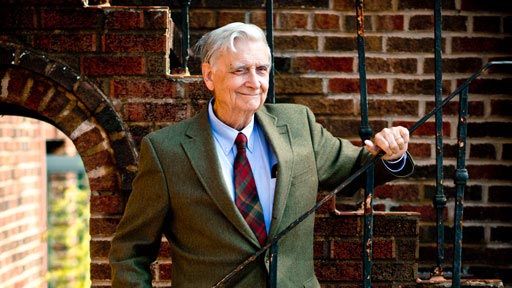 I have decided to focus my “homework” leading up to the 2012 World Science Festival in New York City on two-time Pulitzer Prize-winning biologist E.O. Wilson and his recent rethinking of a long-held tenet of evolutionary biology known as inclusive fitness. The theory of inclusive fitness provides a logical mathematical framework for rationalizing kin-selection, a way to explain why some organisms sacrifice themselves to benefit their kin. While such behavior may appear to be for the greater good of a species, evolutionary biologists have traditionally pegged it to selfish motives: the built-in drive to pass on genes from one replicating machine to the next can handily explain all traits, including perceived altruism. This view is still widely accepted by many prominent scientists—Alan Grafen, Robert Trivers, and Steven Pinker to name a few.
I have decided to focus my “homework” leading up to the 2012 World Science Festival in New York City on two-time Pulitzer Prize-winning biologist E.O. Wilson and his recent rethinking of a long-held tenet of evolutionary biology known as inclusive fitness. The theory of inclusive fitness provides a logical mathematical framework for rationalizing kin-selection, a way to explain why some organisms sacrifice themselves to benefit their kin. While such behavior may appear to be for the greater good of a species, evolutionary biologists have traditionally pegged it to selfish motives: the built-in drive to pass on genes from one replicating machine to the next can handily explain all traits, including perceived altruism. This view is still widely accepted by many prominent scientists—Alan Grafen, Robert Trivers, and Steven Pinker to name a few.
Classical genetic fitness is measured by the number of offspring an organism can produce and support. Inclusive fitness adds on to this idea by allowing the survival of blood relatives to contribute to overall fitness. An organism’s inclusive fitness includes “offspring equivalents” or relatives that share the same percentage of genes as direct offspring; a sister is as valuable as two half brothers are as valuable as four first cousins and so on. The rule of inclusive fitness was once neatly explained by a simple equation: rB>C, where r is a relatedness factor, B is the fitness Benefit to the altruistic organism, and C is the Cost of genetic fitness to the organism for carrying out the act of altruism. This equation was put forth and formalized by the British evolutionary biologist W.D. Hamilton in the early 1960’s.
In 1965, Wilson, then a young entomologist, was one of the first scientists to grab hold of Hamilton’s equation and used it to explain altruism he observed in ant colonies. Wilson quickly became an evangelist for the idea, championing the theory that altruism had emerged through natural selection as a means to pass on genes to the next generation, not as a selfless act of moral transcendence.
But over the years Wilson saw cracks in the armor of the theory of inclusive fitness. His doubts continued to build around a theory he had helped elevate to the level of near scientific consensus. Eventually the errors piled too high for Wilson to ignore. In 2010, he and his colleagues published a paper in the prestigious scientific journal Nature claiming a paucity of real-world evidence supporting the claim that organisms displaying altruistic behavior follow the rule rB>C. The authors went further to say that the factors in the equation, B and C were too difficult to quantify. Wilson, for his part, admitted that the equation was elegant and alluring, but just too simple to work in practice.
Wilson’s “flip-flop” (said with great respect, as changing one’s mind in science is more often a virtue than a vice) has caused an uproar in the scientific community and drawn heavy criticism from some of the most vocal evolutionary biologists, including Jerry Coyne and Richard Dawkins. Wilson’s critics have said he is using his authority to make assumptions without backing up his claims with real-world data. The critics also point out that a large group of evolutionary biologists (more than 140) have publicly announced their support for the theory of inclusive fitness despite Wilson’s apostasy. Wilson has countered his critics by pointing to a lack of biological examples showing altruistic traits emerging in species that follow Hamilton’s equation. The dust-up makes for the juiciest kind of intellectual debate, one that sends scientists out into the field in search of more evidence.
Meanwhile, Wilson’s apparent abandonment of the selfish-gene hypothesis has opened the floodgates for social scientists, as they jump aboard the cooperation-train and use “group selection” to explain societal phenomenon like the persistence of religion in human society and the rapid growth of social networks. Among these scholars are psychologist Jonathan Haidt and social commentator David Brooks. The worry here is that the scientific debate over evidence will be overlooked by hungry mobs of humanitarians eager to extract rationale for morals out of biology. I am eagerly looking forward to attending Wilson’s special address at the sold-out event, On the Shoulders of Giants, at the World Science Festival this Saturday, June 2nd, 1:00 PM EST, when a spirited debate should ensue.
Comments
Trackbacks
[…] way acting selfishly, even though it may look as if we favour the group rather than ourselves (see here for reference). We learn to count on our fellows within the community for help when we are […]